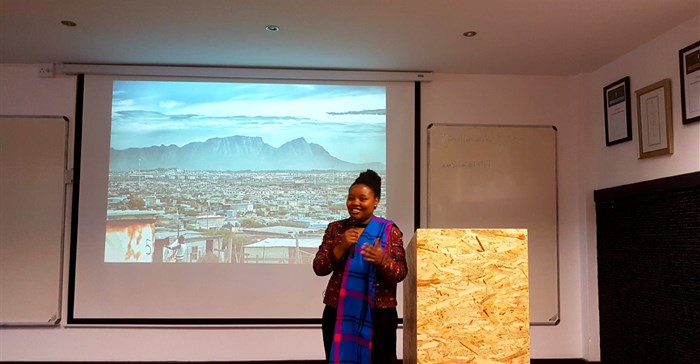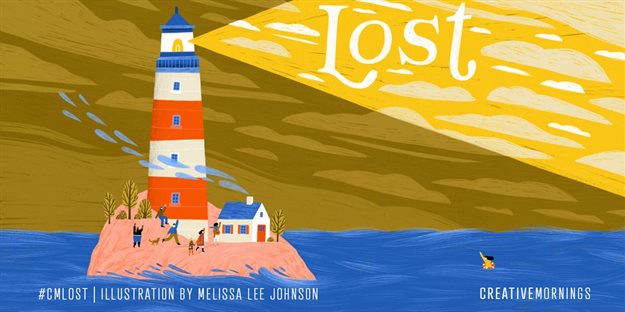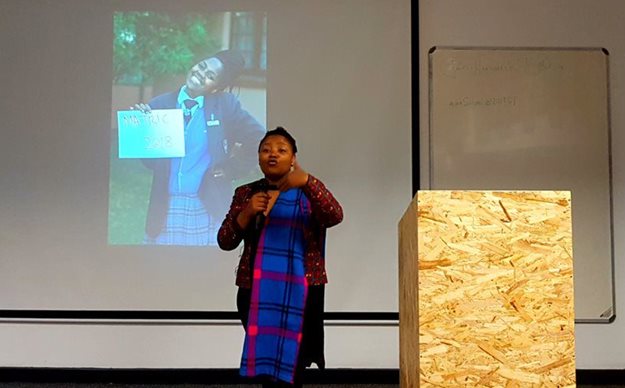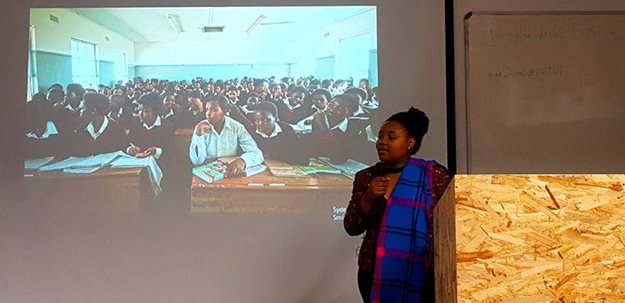
Top stories






More news

ESG & Sustainability
#AGES2026: How to back Africa's next-gen green and blue entrepreneurs
















Logistics & Transport
#Budget2026: Road freight logistics and what it means for consumers


November’s Creative Mornings global theme was that of ‘Lost’, chosen because it’s the time of year where we start planning ahead for the future, so wading through the unknown can feel scary and risky as you float around wondering if you’re going in the right direction, uncertain of what’s next.
But being lost isn’t necessarily something to fear. Instead, Creative Mornings calls it a “collaboration between possibility and uncertainty”; an excuse to get one step closer to a more fulfilling life as what you were comfortable with may not be there anymore, but you have the opportunity to reconnect with yourself and embrace discovery.
It’s in these “in-between” moments when you turn to your inner beacon and pay close attention to where it’s guiding you, as the light that blazes within you; a signal made up of your values, dreams, and priorities.

Creative Mornings says essayist Anaïs Nin put it best when she wrote:
The unknown was my compass. The unknown was my encyclopedia. The unnamed was my science and progress.So shine your light, ask for help and let go of the idea that you have to make a perfect choice. You may feel lost, but you are not alone.
Mkaza-Siboto did just that. Born in East London and raised in Khayelitsha, she holds a BA in theatre and performance, as well as honours in African Studies from UCT.
But in 2014, Mkaza-Siboto’s career path took a turn when she and her husband founded the Emagqabini Education Academy NPC.
"She is the daughter of your domestic worker, she is the cousin to your cleaner, she is the cousin to your security guard. What will you do to help her succeed?" Cindy Mkaza-Siboto, Emagqabini Education Academy #TedxCapeTown
— Basha Magwape Azania (@bashamagwape) November 17, 2018
Mkaza-Siboto says her heart sank and dragged her away from France and back to her reality in South Africa. She pictured what her sister’s path would be like without any intervention.
That’s what sparked her need to investigate and solve the problem.
There was an organisation in Khayelitsha that offered free tutoring at the time, but they were closed for the day by the time Yonela could arrive after school.
Paid-for tutoring was also on offer but would have come to R7,200 for just 1 subject over 10 months – simply unaffordable.Mkaza-Siboto shared her findings with her husband Linda Siboto, who suggested that her sister move in with them in Rosebank.
While this would provide a short-term solution to the problem, they still wanted to figure out a way to provide help in Khayelitsha.
They knew that scraping by with a ‘South African pass’ at the government benchmark of 33% wouldn’t provide a bright future, and Mkaza-Siboto had a younger brother and cousins also living in Khayelitsha who would go through the same system.
And so, Emagqabini Education Academy initially started as a homework support group, with volunteer tutors.
They had limited resources to start with – just Mkaza-Siboto’s car and organising skills to put the programme together, and her husband’s experience in teaching English.
So Mkaza-Siboto submitted a letter to the newspaper asking for volunteers, and started the homework support group from the garage of a friend in Khayelitsha.
People started opening their homes for use once the programme started. You’d find maths lessons unfolding in the one house and English and science further up the road, before the progamme found its home in the local library.
Mkaza-Siboto remembers the first time a learner walked into the academy accompanied by a parent.
Lulama’s mom told them that he had already failed grade 8 three times. They soon realised that his poor grasp of English was his downfall, and once assessed they found it to be at grade 4 level.
Lulama was sent to an English tutor after school and to the Emagqabini programme on Saturdays. His self-confidence increased and soon he was also helping others in the tutoring space.
Lulama’s story is by no means an isolated one. Overall literacy skills are low, with the 2016 Progress in International Reading Literacy (PIRLS) study finding that eight out of every 10 Grade 4 learners cannot read for meaning in any language – not just English.
Mkaza-Siboto also spoke of learners like Sisonke, who wasn’t really interested the first time she attended, but slowly started bonding with the team and eventually said she had never loved people outside her family the way she loves the Emagqabini team.
That’s why Emagqabini also offers outings. These include excursions to watch movies like Marvel’s Black Panther, so the learners are exposed to the world beyond Khayelitsha.
For example, in 2015 Emagqabini Education Academy partnered with the Royal Cape Yacht Club, which sparked dreams for many of the learners to travel the world, giving them focus and a bigger dream.

This is but one reason why Mkaza-Siboto’s sister Yonela is seen as Emagqabini’s greatest success story – she reached matric last year and passed well, having made the jump from ‘at risk’ learner to finishing in the top 6 at her school!
Yonela is now completing her first year of tertiary studies, and next year will complete the Cape to Rio yacht race.
Mkaza-Siboto explained that they usually work in groups of 6 students per tutor, which is a big difference from the real-life high school classes where there are often 60 students to 1 teacher.

In that situation, the students are less likely to raise a hand to ask a question and the teacher is less likely to reach every student, especially as each student follows an individual journey.
Mkaza-Siboto says this links to the fact that many of the volunteers didn’t receive help in their own studies, and want this next generation of students to succeed.
They’re there to support pupils who have illiterate parents or caregivers who are not physically present to help with studying. That’s why the volunteers agree to sign on for a few years, to build relationships with the students.
The academy now supports 100 learners at two sites in Khayelitsha, Mkaza-Siboto says that while it was her sister’s academic struggles with grade 8 that sparked the journey, there are so many other students on a similar path.
They live in the townships of Gugulethu and Langa, the rural parts of the Eastern Cape. They walk many miles to get to school each day, often braving gang-infested areas of Manenberg to get an education.There’s no income-generating model at the moment, but Emagqabini is an holistic programme, so the core tutoring is six hours per week, one-on-one mentoring and help in applying to tertiary institutions and for internships is available for those who stick with the programme until they are in grade 12.
There’s also a career-planning path depending on the learner’s school year, and a career expo that showcases ‘new age’, non-traditional careers like social media and coding, as well as job shadowing.
Mkaza-Siboto says the challenges of the current education system require creative solutions to change the world. So what can creatives do to make it a better place?
She says to do what you can to connect the young people getting lost in the townships, and challenged each attendee to connect with at least one learner and create change together.
This was followed by a short Q&A session in which Valentino Barrioseta from Spain of the Bridges Music Academy shared that the creative school based in Langa teaches music, entrepreneurship and mindfulness.
The Bridges’ focus is on rippling out what they learn to the community, so he asked Mkaza-Siboto what success looks like to her.
More than just a music school - Bridges Music Academy launches in Langahttps://t.co/SpbUVNtTyK pic.twitter.com/jDaMQgvjg9
— Channel24 (@Channel24) November 17, 2019
This means they can track the percentage of the learners’ that increase their academic performance from start to exit, as well as how many access tertiary education and internships, and also helps with job placement so they can track the student lifecycle post-matric.
The model is sustainable in that they keep finding new tutors but much of their success comes from building a relationship with the learners, both in person and over WhatsApp.
Some of their past learners sign on as volunteer tutors for the next batch, as they’ve seen the power of this model.
Mkaza-Siboto says that all students work to their best potential when they feel support and love, and that they are championed. That’s the crux of the Emagqabini Education Academy’s success.
No wonder Mkaza-Siboto has since been recognised as one of the 100 Brightest Young Minds in Africa, as well as a Spark International change-maker for her work with the academy. Follow the Emagqabini Education Academy on Twitter and Facebook for the latest updates.
